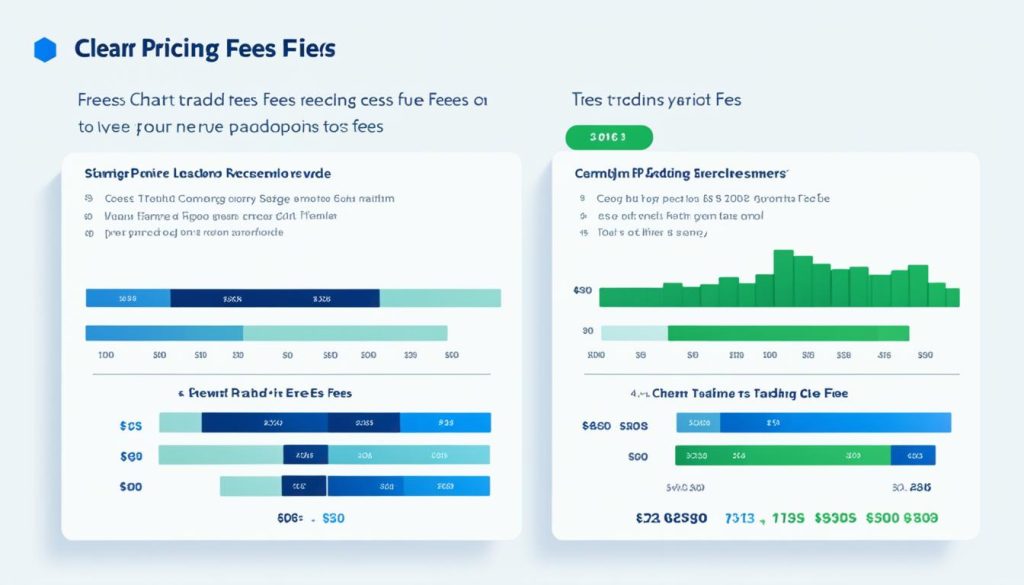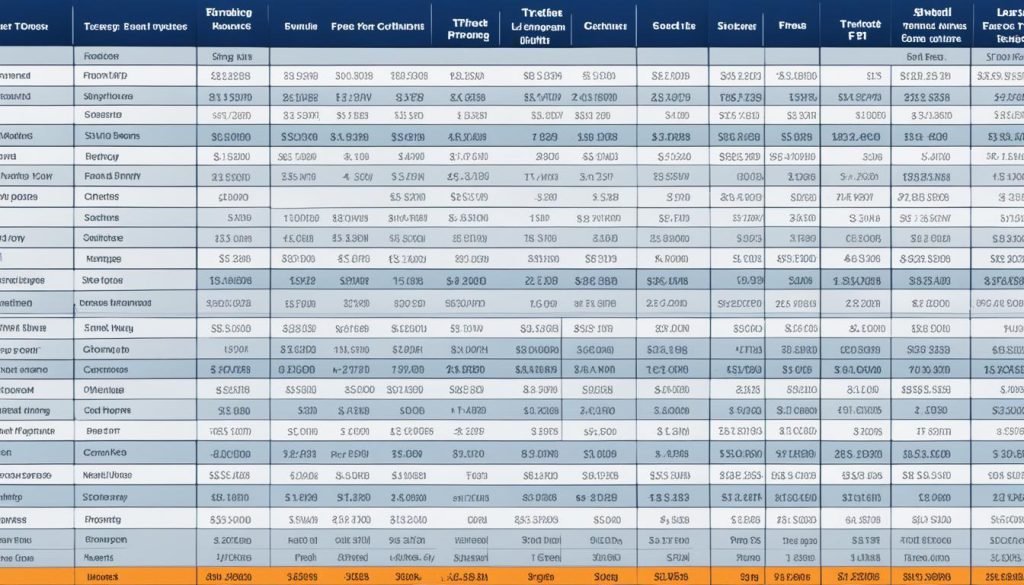When it comes to stock trading, understanding the fees involved is essential. Merrill Edge, a leading online brokerage, offers transparent pricing and cost-effective solutions for investors. By providing clear information about their fees, Merrill Edge ensures that investors can make informed decisions about their trading strategy. Let’s explore the stock trading fees offered by Merrill Edge and how they can benefit your investment journey.
Key Takeaways:
- Merrill Edge offers transparent pricing for stock trading fees.
- Some trades with Merrill Edge are commission-free.
- There may be costs associated with owning ETFs and mutual funds.
- It’s important to compare Merrill Edge’s trading costs with other online brokerages.
- Investors should assess the fees and costs associated with different investment options.
Understanding Merrill Edge Pricing and Account Fees
When it comes to investing, understanding the fees and charges associated with your brokerage account is essential. Merrill Edge, a leading online brokerage, offers transparent pricing and cost-effective trading solutions for investors. While some trades are commission-free, it’s important to be aware of other fees that may apply.
Merrill Edge waives commissions for online stock, ETF, and option trades placed in a Merrill Edge Self-Directed brokerage account. This means you can trade these assets without incurring any additional fees. However, it’s important to note that other fees may apply for various services.
For example, if you engage in margin transactions, there may be fees associated with borrowing funds to trade. Additionally, special services such as stock registration or gifting may come with their own charges. When transferring or terminating your account, there may be account transfer and processing fees to consider. It’s crucial to review the pricing page on Merrill Edge’s website for detailed information about these fees and charges.
“Merrill Edge waives commissions for online stock, ETF, and option trades placed in a Merrill Edge Self-Directed brokerage account. However, it’s important to be aware of other fees associated with margin transactions, special stock registration/gifting, account transfer and processing, and termination.” – First Source
Investors should carefully consider these fees and charges when assessing the overall cost of trading and managing their investments. By understanding these costs upfront, you can make informed decisions that align with your investment goals and preferences.

It’s worth mentioning that brokerage account fees and charges can vary among different providers. Comparing Merrill Edge’s pricing and account fees to other online brokerages is an important step in ensuring you’re getting the best value for your investment needs.
When comparing online brokerage fees, it’s critical to consider the total charges associated with trading. This includes not only commissions but also per-contract fees and transaction fees. By evaluating the overall trading costs, you can make an informed decision that suits your unique trading style and preferences.
While Merrill Edge offers competitive pricing, it’s advisable to explore all the available options and assess their associated fees. This will help you optimize your investment strategy and reduce unnecessary costs.
Comparing Merrill Edge Trading Costs to Other Online Brokerages
When it comes to trading costs, investors should always consider comparing Merrill Edge with other online brokerages. While Merrill Edge offers competitive pricing, it’s essential to assess the total fees, including trading charges, per-contract fees, and transaction fees, to make an informed decision. Evaluating these costs in comparison to other brokers in the market will help investors determine the most cost-effective solution for their trading needs and goals.
Merrill Edge prides itself on its transparent pricing structure, enabling investors to understand the expenses associated with their trades. However, to ensure a comprehensive trading cost comparison, potential investors should research and analyze the fees of other brokerages as well. By examining the complete picture of trading costs, investors can have a clearer understanding of the potential charges and make an informed decision on which brokerage best suits their needs.
As mentioned in [First source], Merrill Edge offers competitive pricing. However, it’s important to note that trading costs may vary among different online brokerages. Some brokerages may offer lower commissions but charge higher per-contract fees or transaction fees. By considering the overall trading costs, investors can weigh the benefits and potential drawbacks of each platform and select the best option for their investment strategy.
Trading Charges
One crucial aspect to consider when comparing trading costs is the trading charges imposed by different brokerages. These charges, which may include commissions and fees per trade, play a significant role in determining the overall cost of executing trades. Investors should carefully assess and compare the trading charges of Merrill Edge and other online brokerages to identify the most cost-effective solution.
It’s worth noting that while trading charges are an important factor, investors should not base their decision solely on these fees. Other considerations such as the quality of the trading platform, research tools, customer support, and additional services provided by the brokerage should also be taken into account.
Trading Cost Comparison
A thorough trading cost comparison allows investors to evaluate the expenses associated with trading on different platforms. This includes analyzing not only the trading charges but also considering other factors, such as account maintenance fees, account transfer fees, and any additional charges that may impact the overall trading cost.
Investors can use online resources such as brokerage comparison tools or consult professional financial advisors to gain insights into the trading costs of various brokerages. These comparisons provide a holistic view of the fees and charges involved, enabling investors to make an informed decision based on their individual trading needs and goals.
By conducting a comprehensive trading cost comparison, investors can ensure they are selecting a brokerage that aligns with their financial objectives while minimizing their expenses. It is important to note that trading costs are not the sole determinant for the success of an investment strategy, but they should be carefully considered alongside other critical factors that contribute to the overall trading experience.

Merrill Edge Account Fees and Additional Charges
In addition to trading fees, Merrill Edge offers a range of account services that may incur specific fees. One such fee is for international wire transfers. When conducting international transactions, it’s important to consider the account fees associated with these services.
The fees for international wire transfers can vary based on several factors:
- The financial institution of the recipient
- Foreign taxes
- Currency conversion rates
- Other charges related to the wire transfer process.
These additional charges are important to keep in mind when initiating international wire transfers through a Merrill Edge account.
By understanding the potential account fees and charges, investors can make well-informed decisions regarding their international transactions. It’s recommended to review the complete fee schedule provided by Merrill Edge to stay updated on the latest charges.

Investment Options and Costs at Merrill Edge
When it comes to investing, Merrill Edge offers a wide range of options to suit every investor’s needs. Whether you’re interested in stocks, ETFs, mutual funds, or fixed-income assets like bonds, Merrill Edge has you covered.
Each investment option comes with its own set of costs and fees, including transaction fees and management fees. It’s important for investors to assess these expenses to determine the most cost-effective solution for their investment goals.
If you’re interested in trading stocks, Merrill Edge offers competitive pricing with transparent fees. With no commissions for online stock trades placed in a Merrill Edge Self-Directed brokerage account, you can make trades without worrying about additional costs. This makes it easier to execute your investment strategy while keeping expenses in check.
For those looking for a diversified investment approach, ETFs and mutual funds are excellent options. Merrill Edge provides access to a wide range of ETFs and mutual funds, allowing investors to choose from various asset classes, sectors, and investment strategies. While these investment vehicles may come with management fees, the potential benefits of diversification and professional management can outweigh the costs.
“Merrill Edge’s investment options provide investors with flexibility and choice. Whether you prefer the potential growth of individual stocks or the diversification of mutual funds and ETFs, there are options available to suit your investment needs.”
Bonds, on the other hand, are fixed-income assets that can provide stability and income to your investment portfolio. While bonds may have lower returns compared to stocks, they carry less risk and can serve as a reliable source of income. When investing in bonds through Merrill Edge, it’s essential to consider transaction fees and other associated costs.

By carefully evaluating the costs and fees associated with each investment option, you can make informed decisions that align with your financial goals. It’s important to balance the potential returns with the expenses involved to ensure a successful investment strategy.
Remember, Merrill Edge’s pricing and fees are subject to change, so it’s always a good idea to stay updated with the latest information. Now that you have a better understanding of the investment options and costs at Merrill Edge, you can confidently navigate the world of investing and work towards achieving your financial aspirations.
Conclusion
When it comes to stock trading fees, Merrill Edge stands out for its commitment to transparent pricing and cost-effective solutions. With a wide range of investment options and competitive fees, investors have the opportunity to make informed decisions based on their unique trading needs and goals.
It’s essential to consider all the fees associated with trading and owning different investment products to ensure an optimal investment strategy. Merrill Edge’s transparent fee structure empowers investors to assess the costs involved in each trade, including commissions, per-contract fees, and transaction fees, enabling them to make well-informed decisions.
By providing a variety of investment options, such as stocks, ETFs, mutual funds, and fixed income assets, Merrill Edge caters to investors’ diverse needs. Investors can diversify their portfolios and manage costs by carefully evaluating the associated expenses, such as transaction fees and management fees, for each investment option.
With Merrill Edge’s commitment to transparent pricing and competitive fees, investors can navigate the stock market confidently, optimizing their investment strategies while keeping trading costs in check.




No comments! Be the first commenter?